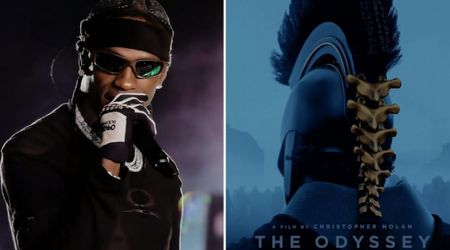EXCLUSIVE | 'Surviving the Silence' makers on retelling Colonel Thompson and Barbara Brass's iconic love story

When the Clinton Administration introduced the discriminatory military law, 'Don't Ask, Don't Tell' in 1993, it prevented many eager and well-qualified queer individuals from serving their country. But prior to this law coming in place, another anti-gay statute had been in place which entirely banned homosexuals from Military service. Comrades that identified as gay and lesbian were forced to serve in silence, and remain closeted if they wanted to have a military career, and those years by far were among some difficult times in LGBTQ history.
In 1992, the military commenced discharge proceedings against Colonel Margarethe Cammermeyer of the Washington National Guard, after revealing in a military clearance some four years before that she was a lesbian. Colonel Patsy Thompson, who had been the Chief Nurse of the Army National Guard at the Pentagon at the time, had been asked to preside over the board that would dismiss Colonel Cammermeyer. To Colonel Thompson, this was one of the most challenging moments in her life for she herself was a closeted lesbian and this forced her to ponder over her own moral dilemma. While Colonel Cammermeyer's story got told in a 1995 television adapted film based on her memoir called 'Serving in Silence' (starring Glenn Close, and produced by Barbara Streisand), Colonel Thompson's remained in the dark, until now.

'Surviving the Silence' is an unscripted film by Cindy L Abel, focusing on the life and military career of Colonel Thompson, and how she and her wife Barbara Brass lived through the military's anti-gay laws for over 37 years. As Colonel Thompson rose through the ranks, the fear of their secret being revealed often plagued her while she served in the military that adhered to the longstanding "homosexuality is incompatible with military service" policy. MEA Worldwide (MEAWW) spoke with director Abel of Atlantis Moon, and producer Marc Smolowitz of 13th Gen, about their latest joint venture.
Abel's meeting with Colonel Thompson and Brass was a chance encounter at the Sierra College, California when she was screening her first film 'Breaking Through' in 2013 which was about openly LGBTQ+ elected officials and the barriers that they broke through to live a life and the career of their dreams. It was there that Abel learned of their life story and decided that she wanted to know more about the couple that had overcome so many obstacles just from being in the military, for over 30 years. Joanie Juster, an activist and LGBTQ+ ally and a friend of Smolowitz, had been the one to introduce Abel to him. In 2014, the two decided to collaborate on this new project, and Smolowitz started his personal journey in getting to know Colonel Thompson and Brass.
'Surviving the Silence' is a product of a seven-year journey. The main narrative of the film unfolds as the retelling of a closeted love story of Colonel Thompson and Brass. In candid interview segments, they share their experiences of hiding their relationship from the world and how they made it work, despite Colonel being away on long-distance assignments to the Pentagon and Panama. They talk about their personal battles with love and how they strived to protect it while trying to preserve Thompson's career. "There's the love story. There's the history behind history that nobody knows about, including myself, and I'd been involved in LGBT politics for a long time at this point," said Abel, talking about how she felt the need to tell their story. "And now these women are coming out publicly. I thought there's a whole lot going on here. There's a story to tell and they're just so lovable and no pretense. They're like the perfect people you would want to have in a movie because they just show up as who they truly are."

"There's so few movies that really put a face to queer women, whether they identify as lesbian or bisexual or queer or they're closeted," Smolowitz added. "And I knew that there was going to be a way into that, that would be super powerful and that the festivals would be interested that everyone would understand why this kind of story would have a place in this sort of larger ecosystem of independent documentary. What was really exciting for me as a producer was that we started to watch in real-time, our two main characters transform into something else that they hadn't been before."
Colonel Thompson and Brass are proud political activists and live in a very conservative, largely Republican county, located in the East of Sacramento. So, the election of Trump saw them becoming very active in fighting the resistance in the county where they have emerged as role models. "Then you start to see how they change on camera, like how they hold themselves differently, how they speak about their experience differently, how they're leaning into their life journey differently", Smolowitz opined. "I think Cindy did an incredible job of letting them be who they are, the arc of the years that we made the movie. That's the beauty of a documentary. That is why we call it unscripted filmmaking, for a reason. These people are real people with blood, sweat, tears, hope, and dreams. Two women, in particular, Barbara and Pat really just become even more human over the arc of working with them."
"They blossomed into the fullness of their humanity," Abel describes her experience while working with Colonel Thompson and Brass. "It's like a typical hero story arc right at the end, the hero should be transformed, should be different than when she or he started. And we see that in both of them. And we see it in little steps along the way, how they found ways to use their voice." For Abel, the whole filming sequence was quite impactful. Listening to their candid accounts is bound to elicit emotional responses and that was kind of heavy on her. Nevertheless, she felt grateful and honored that the duo trusted her to tell their story. "I was honored that they were entrusting us with a story that had never been told before. And they were trusting us to do right by them to tell it in all its fullness. And those are the main emotions that I have towards them that is gratitude and honor, and, deep respect," she added.

The documentary film also includes a rare moment where Colonel Cammermeyer recounted her experience of being discharged from the military as Colonel Thompson presided over the board. Although she's previously talked about what happened to her in her memoir, it was the first time that she had a conversation about it on-camera, with Colonel Thompson. While they were filming the scene with the cinematographer, Abel recalled feeling incredibly moved. "I looked over at him [cinematographer] a couple of times and we both were like - just a little - tears just coming down, because the beauty of that moment when Pat was saying, 'I'm so sorry, I had to do that', and Gretta is saying, 'We won because of you'. It was like she was giving Pat all the redemption for what she had carried around for 20 plus years," said Abel. "Watching these two soldiers who had been through the various types of wars, and who had served a country that did not want them. Watching these two soldiers have a conversation about changing national policy was just unbelievable. I think it was also a great way to see their personal styles."
The film comprises of some very artistic visuals juxtaposed with interviews and licensed archival footage. The visual elements in the film are very attention-grabbing, especially with Abel and Smolowitz's ideas to incorporate animations where re-enacting fell scarce. "We tried to do an artistic mix with some key moments having their own, either evocative B-roll or evocative animation, to illustrate what was happening on-screen," Abel explained. "We wanted to give folks a way to know where they were in time, what was happening, what law were homosexuals serving under at that particular moment. And we didn't want to just do text on-screen. We wanted to have a graphic representation and keep some movement in it", she said commending the film's editor and director of photography, Michael Bruno for his editing techniques.
"I think one thing that's been really delightful all along is sort of Cindy's vision has been clear and coherent and intact, from the beginning. She has known exactly what story she wanted to tell and how she wanted to tell it," Smolowitz concurred. The animations add a touch of the archival feel to the film. "There's an aspect of what Cindy has done here that is actually quite scripted, but ironically enough, in an unscripted movie. It's a sort of writerly task, to sit down and figure out how you want to treat the stories of these three women and give them equal weight given the overall arc (sic)," Smolowitz added. "You're sitting with this movie and then all of a sudden you're learning about the Holocaust. And so you have all these kinds of different sorts of versions of the 20th century from the perspective of these three women that are really quite lush and involving and unique in these kinds of standalone ways. And I think when you see them sort of side by side, it is a feature-length experience."

The film had its digital premiere at the Ashland Film Festival in Oregon, on June 1, just in time for Pride Month. The film will be screened at Q Fest St Louis between 19 and 28 June, followed by Kashish, Mumbai International Film Festival, India between July 22 and 30 July. Due to the unprecedented pandemic, film festivals have resorted to a digital platform to screen their entries, but so far the online response to 'Surviving the Silence' has been rather positive, Abel and Smolowitz affirmed. Many people online have been reviewing the film as inspirational and meaningful while also commenting on it being sentimental and a heart-breaking real-life account of a love that was kept secret for a long time. Others have deemed it a tear-jerker, seeing the hardships that the three women have had to go through. In many ways, the film is a contrasting account to Colonel Cammermeyer's story, and they hope that it continues to bode well with all their viewers.
"This is the story that people need to know in order to really understand that original story in a way that has nuance and isn't just like historical record," said Smolowitz. "And I think that actually younger people and younger audiences, they love that kind of filmmaking. It's this sort of beautiful aspirational journey, but it also introduces them to a historical narrative that they thought they knew or that they may have heard of. But now they know."










